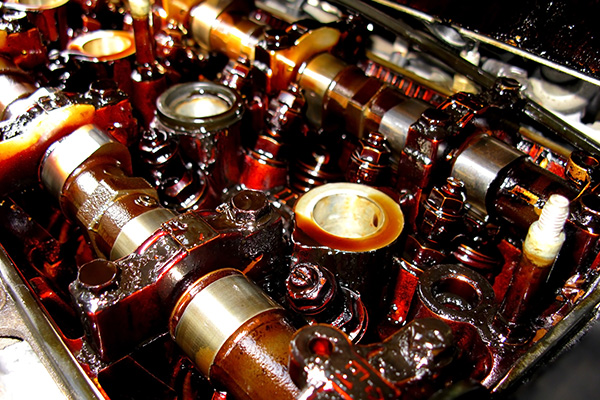
Fresh oil does a lot of heavy lifting inside your engine. It reduces friction, carries away heat, suspends contaminants, and seals tiny clearances so parts move smoothly. As miles and months pass, that same oil slowly loses the qualities that make it protective. If it stays in service too long, wear starts to climb and small problems begin to stack up. Here is what really happens when oil ages past its useful life and how to keep your engine safe.
Why Oil Breaks Down Over Time
Every heat cycle changes oil at a molecular level. High temperatures thin it out, then cool downs thicken it again. Oxygen reacts with the base oil and starts oxidation. Fuel and moisture mix in during short trips. Detergents and dispersants get used up holding grit and soot. Eventually the oil cannot do its job as well as it did on day one. It still looks like oil, but its protective film is weaker and less stable under load.
Viscosity Drift and Cold Start Wear
Engines need the correct viscosity to keep a strong oil film between moving parts. Old oil often shears thinner than intended during high heat, then thickens from oxidation byproducts. That drift in both directions hurts protection. Too thin at operating temperature means metal surfaces can touch during hard acceleration. Too thick on a cold morning slows flow to the camshaft, timing components, and turbo bearings if equipped. Most engine wear happens in the first seconds after startup, and aged oil makes that period tougher on parts.
Additives Get Used Up
Modern oils carry an additive package that does much of the real work. Detergents keep deposits suspended. Anti wear agents protect under extreme pressure. Antioxidants slow chemical aging. Over time these additives are consumed. Once depleted, varnish and sludge form more easily, and the oil can no longer hold contaminants in suspension. That is when sticky rings, noisy lifters, and slow acting variable valve timing start to appear.
Contaminants Build and Circulation Suffers
Engines always generate a little soot and metal dust. Short trips add moisture and a touch of raw fuel to the crankcase. A healthy filter removes the larger particles, but the smallest ones stay in the oil. As oil ages, those fines collect on hot surfaces and in tight passages. You may notice:
These are signs the oil is carrying more than it should and that small passages may be narrowing.
Heat Control Gets Harder
Oil is part of the cooling system. It carries heat away from pistons, bearings, and turbochargers. Oxidized oil does not transport heat as well, so temperatures in hot zones rise. That extra heat accelerates oxidation even more, which creates a cycle that speeds up aging. In turbo engines, this can leave baked deposits around the turbo shaft after shutdown. In non turbo engines, it still hardens seals and bakes varnish onto moving parts.
Extended Intervals vs Real World Driving
Many vehicles show long oil change intervals in the dash menu. Those numbers assume steady highway trips with minimal idling. City driving, short hops, towing, dusty roads, and long warm ups shorten the safe interval. If most of your trips are ten minutes or less, moisture and fuel dilution never fully burn off. In that case, a time based interval can be smarter than a mileage based one. Six months is a good rule for low mileage drivers even if the odometer did not move much.
How to Tell If the Oil Stayed in Too Long
Color alone does not tell the full story, but a few checks help. Rub a drop of oil between your fingers. Gritty texture points to heavy contamination. A sharp fuel smell suggests dilution. If the oil level rises between checks without adding oil, that often means fuel made its way into the crankcase. If the engine sounds louder than usual on cold starts or the check engine light flags cam timing codes, the oil may have lost the ability to keep hydraulic parts working freely.
Simple Habits That Protect the Engine
You do not need special tools to help oil last its full interval. A few habits make a real difference:
- Take one longer drive each week so the oil reaches full temperature and moisture evaporates
- Use the exact viscosity and specification shown on the oil cap or in the owner manual
- Replace the oil filter with a quality part at every change
- Fix misfires and intake leaks quickly so excess fuel does not enter the crankcase
- Keep the PCV system clean so crankcase vapors flow as designed
These small steps keep the oil cleaner and the additive pack effective.
Oil Service and Engine Checks in Corpus Christi
If your engine sounds a little louder, the oil smells burnt, or the change reminder is overdue, do not wait for a warning light. A timely service refreshes the additive package, restores the correct viscosity, and gives a technician a chance to spot early leaks or sludge before they turn costly. That is the simplest way to protect timing components, turbos, and bearings for the long haul.
Keep Your Engine Protected at TC Auto Service in Corpus Christi, TX
TC Auto Service sets the correct oil and filter for your vehicle, checks the PCV system, and looks for early signs of varnish or sludge that point to extended intervals. Whether you drive short trips or rack up highway miles, we will set the right schedule for your engine and climate.
Schedule your oil change today and keep your engine protected from the silent damage old oil can cause.